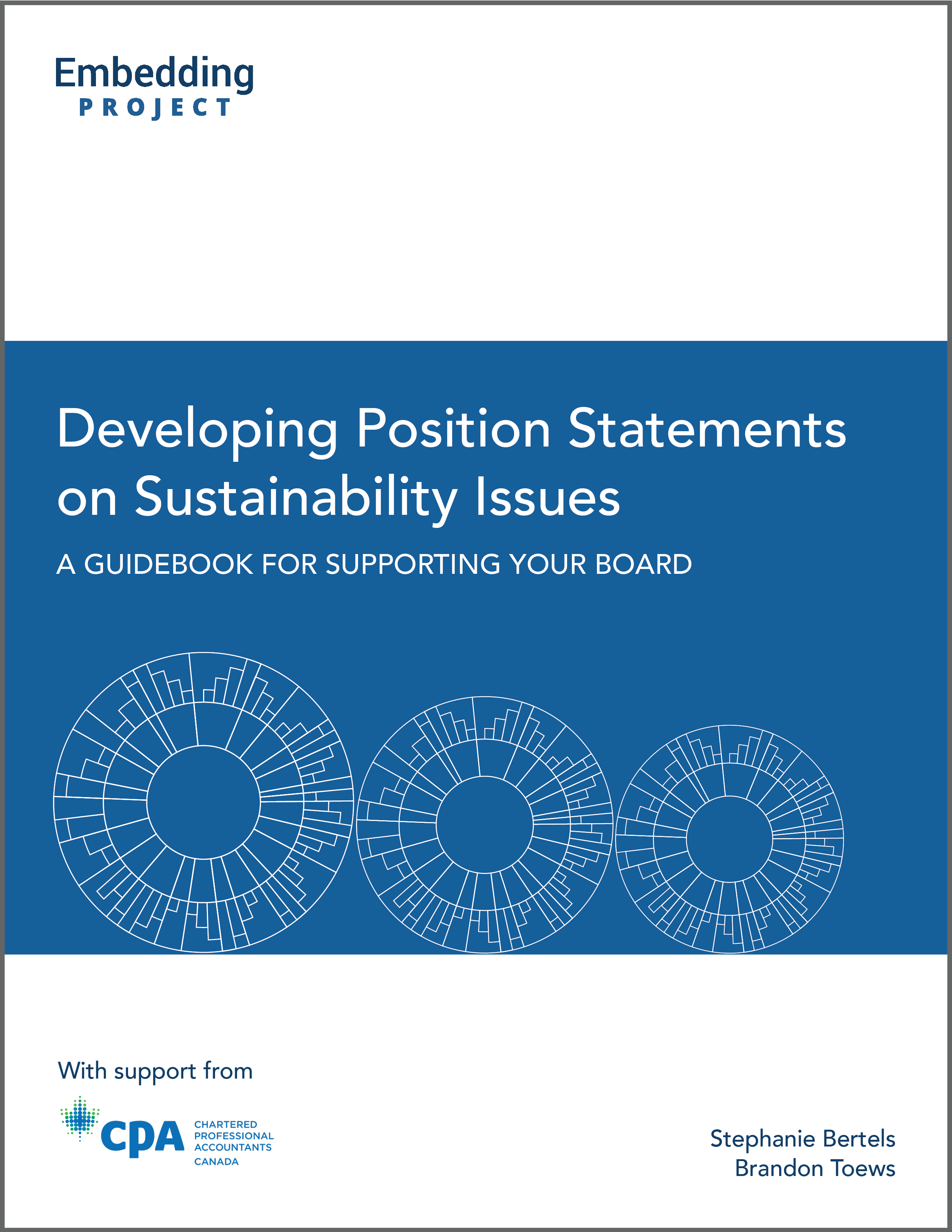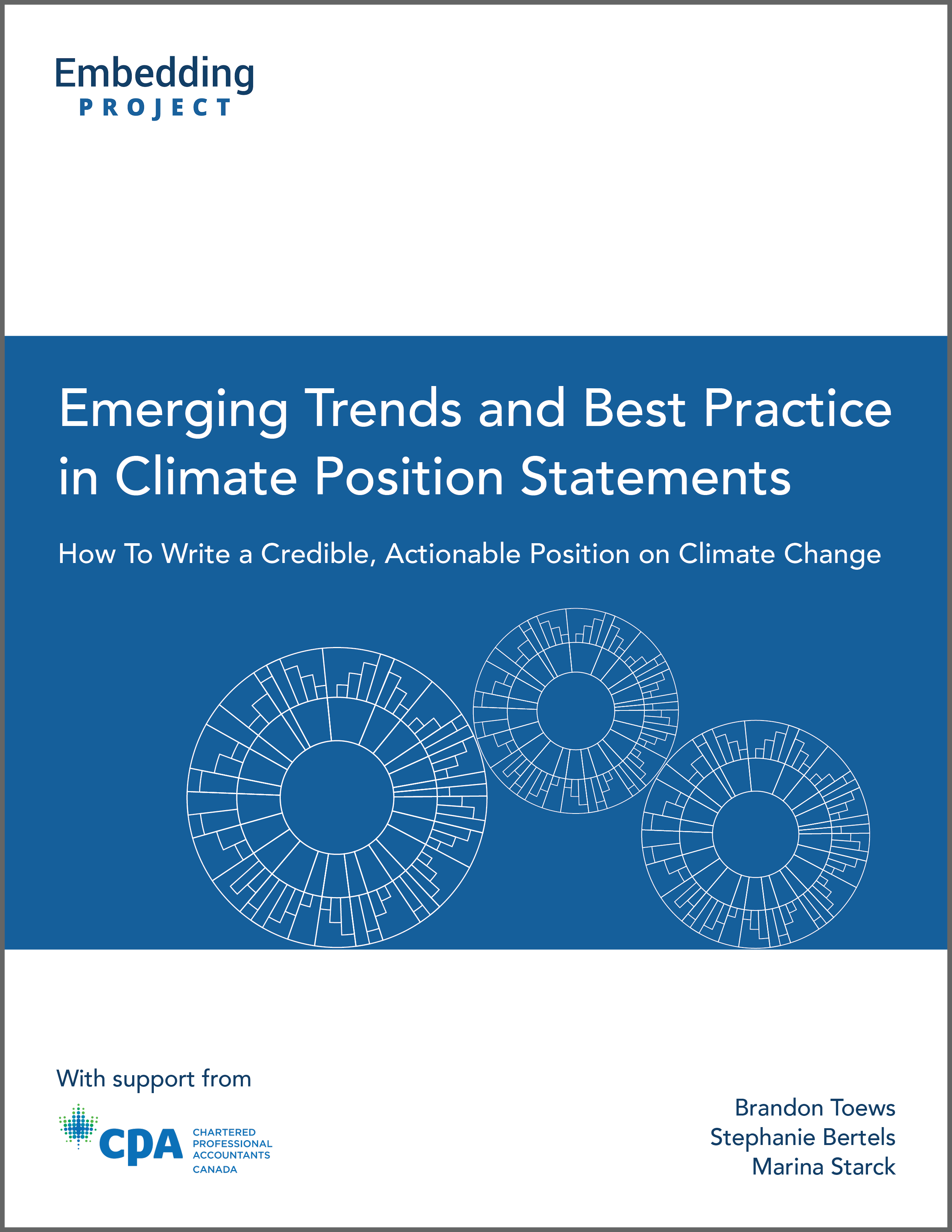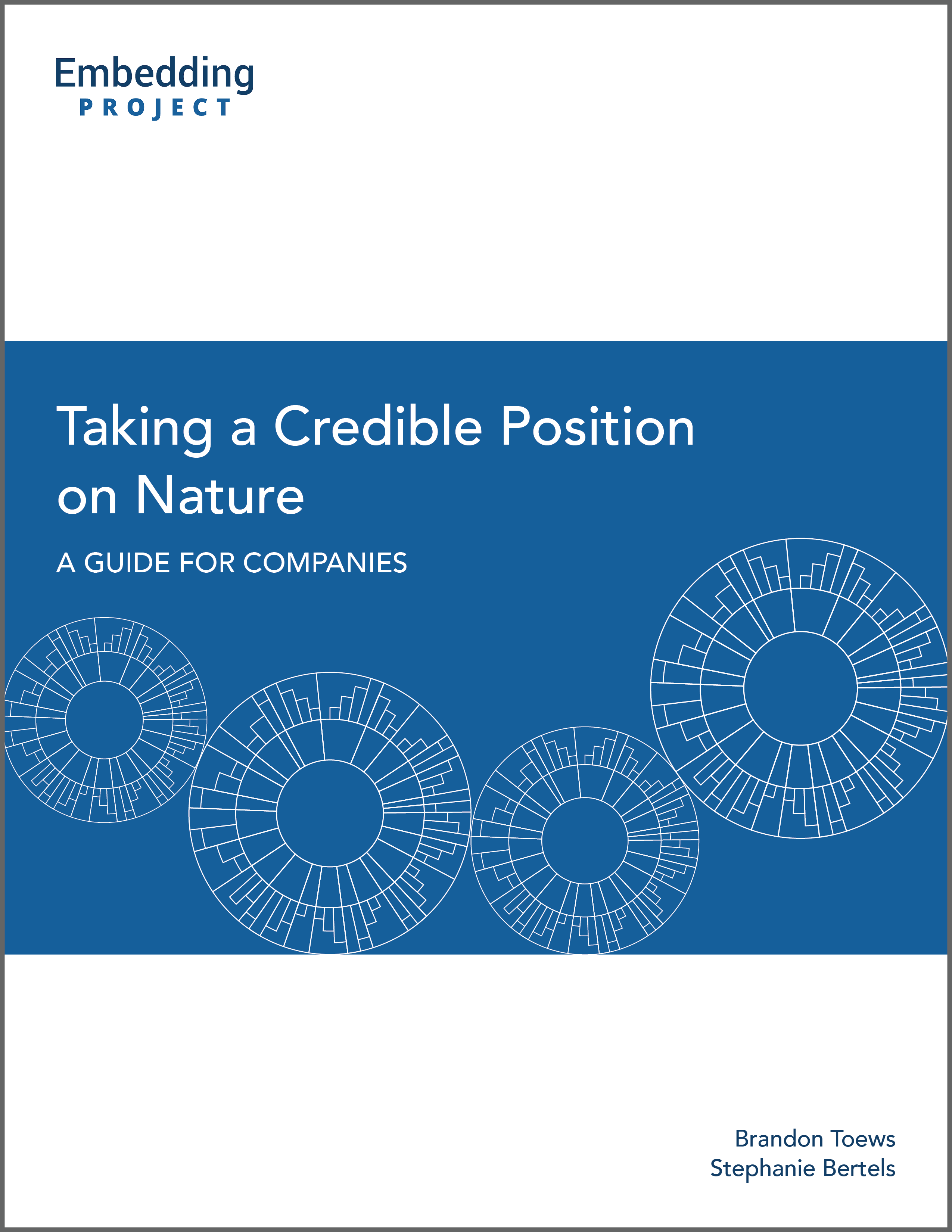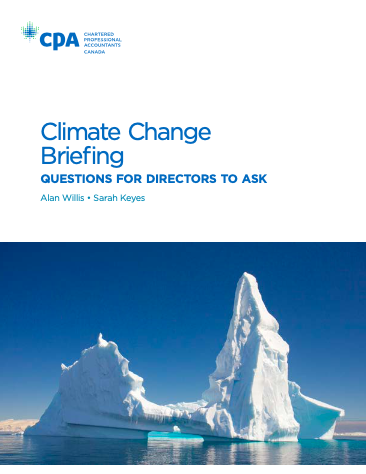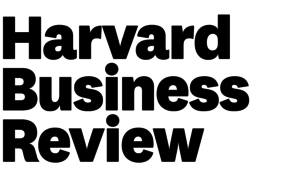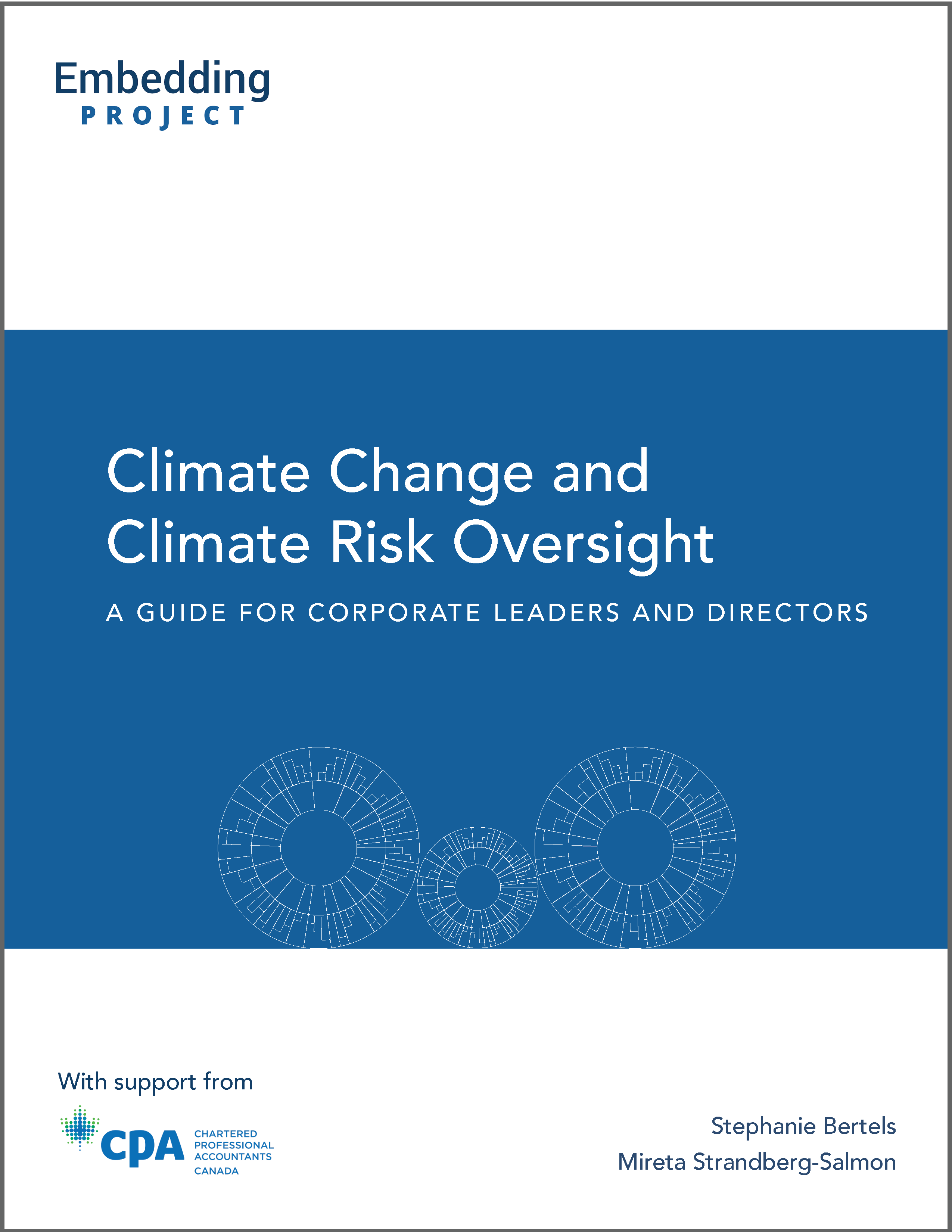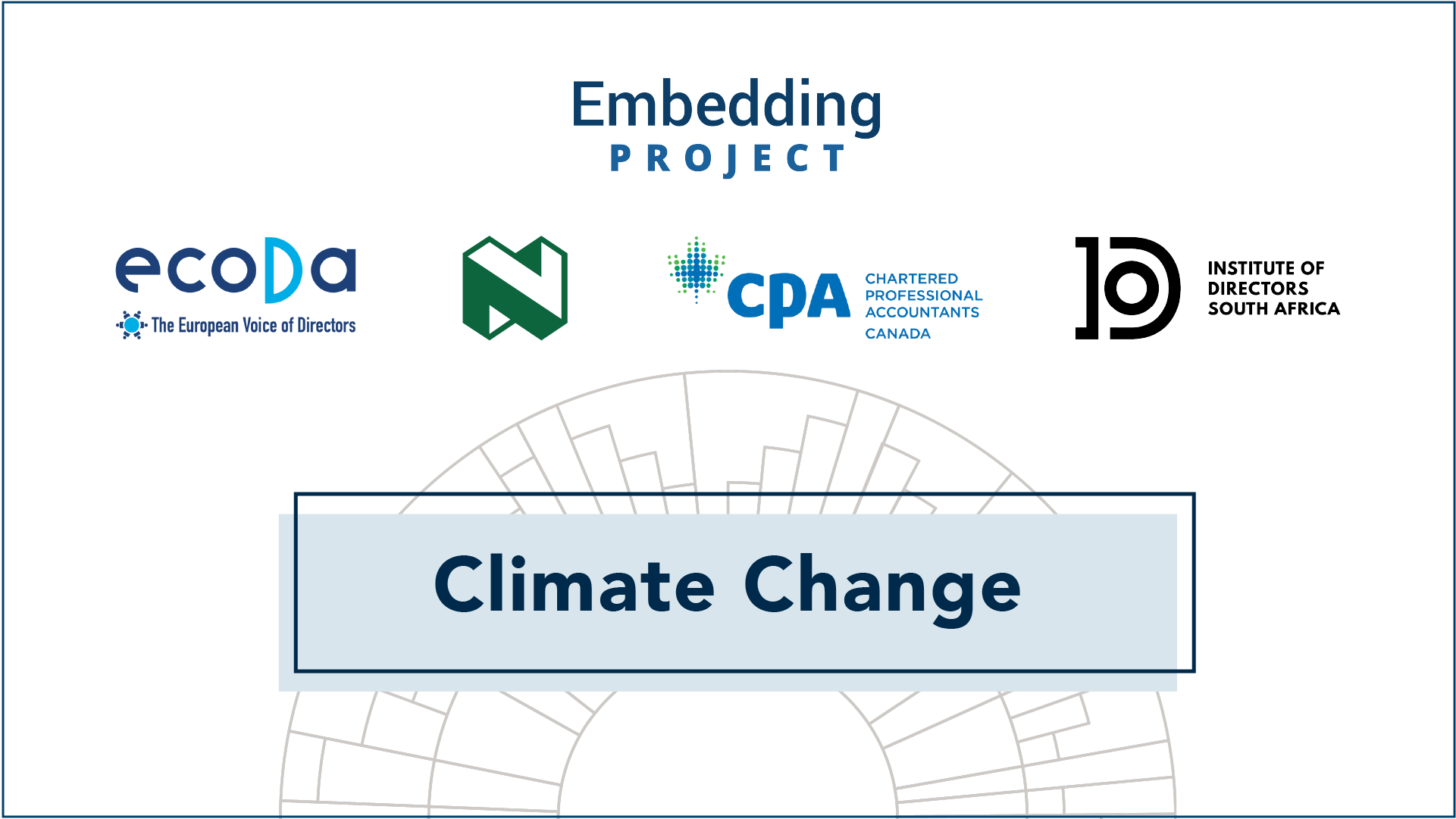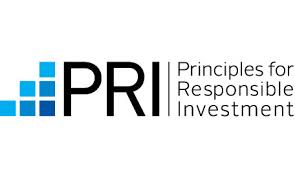Govern
Description
These resources will help you to adjust the governance structures and processes used to direct and oversee your organization, to enshrine your commitment to delivering systems value, and to contribute to social and environmental resilience.
Share this Practice on:LinkedIn
Resources
Sustainability Governance
Developing Position Statements on Sustainability Issues
There is growing pressure among companies to link social and environmental limits to corporate strategy and goal-setting. However, the result is often a lengthy document that fails to make strategic connections between specific issues and their implications on business decision-making. We developed this guidebook to help you articulate a concise and transparent board level position on key environmental, social, and governance issues. Drawing upon in-depth analyses of over 4,000 board position statements; over 200 interviews with CEOs, directors, and board chairs; and concepts outlined in our series on the Road to Context, this guidebook provides a checklist for crafting a contextual board position statement and includes examples from a range of industries and global settings.
Emerging Trends and Best Practice in Climate Position Statements
Climate change is happening, and the impacts are intensifying. Companies are expected to take a position on climate change and outline an appropriate response. The Embedding Project’s climate position guide helps companies to articulate a concise and transparent board level position on climate change. Drawing on in-depth analyses of over 2,600 climate position statements, this guidebook provides a checklist for crafting a climate position statement with concrete examples from a range of industries and global settings.
Taking a Credible Position on Nature
There is growing pressure on companies to publicly acknowledge the unprecedented nature loss we face, and what they plan to do to address it. To help them do so, we reviewed over 1,000 statements on nature loss, biodiversity, and ecosystem stewardship from a wide range of geographies and industries, and identified examples of how companies are explaining the issue of nature loss, linking the issue of nature loss to their strategy, and clarifying their commitments to protect and restore nature. We hope this guide is helpful to you in articulating your own credible position statement on protecting and restoring nature.
Position Database
Is your company interested in taking a public position on an ESG issue?
To help companies develop strong, clear positions, we will maintain a public database containing leading positions articulated by large companies globally.
Our governance guide outlines how companies should articulate their positions, and we have applied this criteria to the positions featured in this database.
Chapter Zero
This platform was created to help non-executive directors (NEDs) ensure their companies are prepared for climate disruption and to translate net zero ambitions into measurable action. It hosts a community of NEDs and offers a free membership for NEDs looking to access events and to connect with peers and subject matter experts. It also features a knowledge hub that can help NEDs understand what credible action looks like and how to achieve it; how to implement a business transition to net zero; how to integrate climate strategy; and more.
ISO 37000:2021 Governance of organizations - Guidance
This resource provides guidance on good, purpose-driven governance of organisations. It provides principles and key aspects of practices to support governing persons and groups on how to meet their responsibilities so that the organisations they govern can fulfil their purpose.
Climate Change Briefing: Questions for Directors to Ask
This brief is a good primer on climate change for directors. It offers 20 questions they can ask management about how they are adapting to and mitigating the impacts of climate change. Part of Chartered Accountants of Canada’s 20 Questions Series, it includes specific questions related to risk, strategy, financial performance, external reporting systems, and controls and governance.
Board's Guide to Trust: The ESG Imperative
Expectations are growing for companies and their leaders to acknowledge and address environmental, social, and governance (ESG) issues affecting society at large, and it is imperative that executives and boards maintain and grow trust in their organisations by demonstrating their ability to navigate ESG risks and opportunities. This report from Edelman and the National Association of Corporate Directors (NACD) explores how ESG factors are transforming "business as usual" and provides early-stage guidance for leaders that want to evolve their mandate in line with stakeholder expectations. The report features checklists and summaries that will help your board to better understand best practices for embedding ESG into strategic decision-making; how the pandemic has changed ESG oversight and stakeholder expectations; and how they can embed the advancement of sustainability into their duties.
How to Set Up Effective Climate Governance on Corporate Boards: Guiding principles and questions
Boards need to be equipped with the right tools to make the best possible decisions for the long-term resilience of their organisations and to provide effective governance around climate risks and opportunities. In response, this paper from the World Economic Forum and PwC proposes tools that support boards to navigate climate risks and opportunities. The principles herein are designed to increase directors’ climate awareness, embed climate issues into board structures and processes, and improve identification and navigation of climate-related risks and opportunities for business. This work contributes to the WEF’s Compact for responsive and responsible leadership, and provides a compass for enabling effective climate governance.
WBCSD's ESG Self-Assessment
This exploratory self-assessment was created to evaluate the integration of key sustainability competencies within board-level decision-making. The multiple-choice questionnaire assesses ESG considerations across five core pillars: purpose & business model; risk management; engagement with management; engagement with stakeholders; and non-financial reporting. Towards building a baseline, this tool may be of help to corporate directors, executives, corporate secretaries, risk committees, and other governance and sustainability professionals tasked with assessing the board’s effectiveness of ESG oversight.
Boards Are Obstructing ESG — at Their Own Peril
Research shows that many boards have little ESG-related expertise, and many do not recognize the importance of tracking and integrating sustainability issues into business planning. This article from Tensie Whelan explains how boards can get up to speed through careful recruitment, learning about and understanding material ESG issues, and requiring executives to align KPIs with key sustainability reporting standards.
Boards: Stepping Up as Stewards of Sustainability
This report by Egon Zehnder and The Sustainability Board Report highlights a gap between board members’ increasing awareness of ESG as a strategic imperative and the lack of action being taken at the board level. The report suggests this is due to board members feeling ill-equipped to take concerted action on ESG-related issues and activities. In response, the report outlines core steps you can take to develop relevant board competencies and provides a framework for assessing individuals’ potential contribution to board stewardship. This guidance will be most useful to board members and HR professionals.
Primer on Climate Change: Directors’ Duties and Disclosure Obligations
This primer from the Climate Governance Initiative can help directors and other senior executives understand the material financial and systemic risks that climate change presents to corporations and their investors. It begins by providing an overview of the evidence of these financial risks, and then examines the obligations these risks create in respect to both the duties of directors and disclosure across different jurisdictions. It also considers the increasing attention to biodiversity risk and its potential to affect directors’ duties.
G20/OECD Principles of Corporate Governance 2023
This set of principles from the OECD is a good starting point for understanding international public sector expectations for what constitutes good corporate governance. It explains setting the legal foundations of an effective corporate governance framework; treating different shareholders equitably; managing investor engagement; disclosing material matters; defining the board’s responsibilities; and ensuring investor decisions contribute to business sustainability and resilience.
Although it is designed for policy-makers, it may also be helpful to legal and finance teams seeking to benchmark and understand government expectations.
Supporting Sustainability Steering Committees
Whether you call these sustainability steering committees, integration teams, leadership councils, or something else, having an internal, cross-functional group to support your company’s sustainability journey can be invaluable. In this blog, we share best practices and lessons learned for establishing and revitalising steering committees to ensure they are a well-functioning support for the business.
Transformational Governance Corporate Toolkit
This toolkit can help you to advance the maturity of your governance practices by taking a principles-based approach - one that enshrines accountability, ethics, inclusivity, and transparency as drivers of responsible conduct. It includes a governance self-assessment tool that allows you to assess your company's baseline on the spectrum of transformational governance, both with regard to their own operations as well as in relation to your partners, suppliers, downstream activities, and other external stakeholders. It also features a series of business briefs, which explore topics such as responsible governmental engagement and the role that boards and executive leaders can play in embedding transformational governance practices;
Designing Sustainability Governance: Board structures and practices for better ESG performance
This report by INSEAD can help you to understand how your board can be structured to better support sustainability. It highlights common board structures and provides a practical pathway for achieving an ideal model - one where sustainability competence and oversight are fully integrated. It also features intermediary options that can be used as stepping-stones towards embedding sustainability, and illustrates six complementary practices to enhance your governance model, such as regular updates from ESG managers and input from external specialists. This resource will be most useful to board directors, executives, and sustainability teams.
Risk Oversight
Climate Change and Climate Risk Oversight
Climate change is a planetary emergency that presents severe risks to businesses, society, and the global economy. No business, regardless of the sector, is immune – and businesses around the world have a key role to play to help avoid the worst impacts. This guide will help you understand the science behind climate change, why climate change matters to your business, and what actions your business can take to accelerate the transition to a net-zero, climate-resilient future.
Climate Risk Oversight for Directors
This 4-part video series will help corporate directors and leaders understand the risks of climate change and their role and fiduciary responsibilities to oversee these risks. We have also created videos specific to the Canadian and South African context.
Climate Risk - Is it on Your Radar?
This brief will help boards to quickly learn and understand the essential connections between climate risk and their fiduciary duty, such as climate change impacts manifesting quickly and in different ways, looming regulations, and growing demands for risk-related disclosure. The brief also provides a list of priming questions that directors should be asking themselves to ensure climate change readiness.
2022 Ceres Guidance for Engaging on Climate Risk Governance and Voting on Directors
This brief from Ceres provides details on some of the key climate change-related topics that investors and proxy advisory firms may want to consider to inform their company engagements and decisions when considering the election of directors responsible for climate change risk oversight. The guidance is largely centered around TCFD "Governance" Recommended Disclosures and the Climate Action 100+ Net Zero Company Benchmark Indicators.
The Chancery Lane Project
The Chancery Lane Project (TCLP) is a collaborative and global effort to deliver climate solutions through the creation of new and practical contractual clauses. These clauses can be incorporated into law firm precedents or commercial agreements, ensuring that every contract and law supports the transition to a low-carbon economy. The TCLP toolkit includes net zero implementation tools; a net zero drafting checklist to help you when drafting or negotiating net zero concepts in contracts; case studies that highlight how TCLP clauses have been applied; and 'Best in Class' net zero clauses aligned with major frameworks, such as the Paris Agreement and Race to Zero. TCLP resources will be particularly helpful for directors, legal professionals, and counsel representatives tasked with creating stronger, binding contracts with value chain members.
ESG in Proxy Statements
This set of examples showcases some of the ways your company can highlight ESG content within a proxy statement, including details on board oversight and activities, letters from the Chair to stakeholders, and shareholder engagement on environmental and social issues.
ESG / Sustainability Governance Assessment: A Sustainable Board Roadmap
The Sustainable Board Roadmap is a tool for boards, management, and other governance professionals and teams to assess and benchmark the board’s ESG / sustainability governance practices. The Sustainable Board Roadmap includes 39 practices for board members, and consists of evaluation questions and a ranking system that allow for a gap assessment of leading practices on ESG oversight by boards. This tool will help improve awareness of emerging trends on sustainability issues, and will help identify which practices are most relevant for your organisation.
Climate Change and ESG-related risks in Value Chains: What Board Directors need to know
This briefing from the Climate Governance Initiative and the Commonwealth Climate and Law Initiative provides guidance on new, existing, and proposed legislation on value chain due diligence, company obligations, and driving due diligence across value chains. This resource also explains the impacts in scope and requirements for due diligence regulations across different jurisdictions.
The Essential Role of the Corporate Secretary to Enhance Board Sustainability Oversight: A Best Practices Guide
Corporate secretaries have a key role in helping Boards build awareness of the risks and opportunities related to sustainability issues and trends. This guide explains the steps a corporate secretary can take to embed sustainability within a board's mandate and includes a checklist for updating governance models to take sustainability into account in board decision-making. The guide also includes a case study that provides practical examples of how a corporate secretary can improve its sustainability-related governance.
Overseeing environmental, social and governance (ESG) matters: A framework for boards
This document from CPA Canada can help boards better understand their role in advancing ESG. The first section it explains the growing importance of ESG for corporate boards, and the second section outlines a six-step ESG oversight framework. This resource provides a good introduction to ESG governance, and while it was designed to support management in engaging with boards of directors on their oversight of ESG issues, it may also be helpful for senior executives and board members as well.
Other Resources
Fiduciary Duty in the 21st Century
This report offers insight into the debate around whether or not fiduciary duty is a legitimate barrier to investors integrating sustainability into their investment processes. It was produced by Principles for Responsible Investing in collaboration with UNEP and the UN Global Compact. The report is based on interviews with over fifty investors, policy makers, lawyers, and regulators.
21st Century Engagement: Investor Strategies for Incorporating ESG Considerations into Corporate Interactions
This guide from Ceres and Black Rock aims to empower investors who are engaging companies on sustainability issues. It explores different tactics (such as shareholder proposals and proxy votes) and outlines methods for asking the 'right' questions. It also includes sample questions investors can ask companies to better understand their approach to sustainability.
Guide for General Counsel on Corporate Sustainability
This guide was created as a response to a growing desire to engage lawyers more fully as sustainability champions. Developed as a joint effort between the United Nations Global Compact, Linklaters LLP, and UC Berkeley School of Law, it will help your legal professionals to better understand and integrate the core elements of sustainability, including business integrity; ESG and fiduciary duties; human rights and supply chain risk management; the role of grievance mechanisms; and ways in which businesses can respond to crisis situations.
So how exactly does Nature serve as a director of a company
This short article from Simeon Rose explains the story of Faith in Nature - a cosmetics brand - becoming the first company in the world to appoint "nature" to its board. The article unpacks the innovative idea of putting "Nature On The Board" and explains how it can be applied by other companies that want to give nature a voice in decision-making. The articles covers three key steps: finding a suitable guardian to represent nature, ensuring the guardian adopts an ecocentric perspective that puts nature first, and recognising that directors’ fiduciary duties align with protecting the natural world. This article will be most useful to board members and change agents that want to do more to protect nature.
Share this Practice on:LinkedIn
